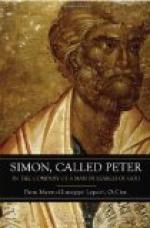“Well, I wouldn’t,” exploded Doyle. “I know your voluntary services—Moody and Sankey hymns on a Sunday night. The men had better be in a decent bar. But turn ’em out in the morning, clean and decent on parade, and give ’em the old service, and it’ll tighten ’em up and do ’em good. Voluntary service! You’ll have volunteer evangelists instead of Army chaplains next!”
Colonel Chichester still smiled, but a little grimly. “We’ve got them,” he said. “And no doubt there’s something in what you say; but times change, and the Church has got to keep abreast of the times. But, look here, I must go. What about a luncheon? I’ve not got much leave.”
“So must I; I’ve an appointment,” said Doyle. “But all right, old friend, to-morrow at the club. But you’re younger than I, Chichester, or perhaps you parsons don’t get old as quickly!”
They shook hands and parted. Sir Robert was busy for an hour, and came out again with his head full of the proposed plans for the aerial defence of London. “Taxi, sir?” he was asked at the door. “No,” he replied; “I’ll walk home.”
“Best way to think, walking at night,” he said to himself as he turned down Whitehall, through the all but empty streets, darkened as they were. The meaning of those great familiar spaces struck him as he walked. Hardly formulating it, he became aware of a sense of pride and responsibility as he passed scene after scene of England’s past glory. The old Abbey towered up in the moonlight, solemn and still, but almost as if animate and looking at him. He felt small and old as he passed into Victoria Street. There the Stores by night made him smile at the contrast, but in Ashley Gardens Westminster Cathedral made him frown. If he hated anything, it was that for which it stood. Romanism meant to him something effeminate, sneaking, monstrous.... That there should be Englishmen to build such a place positively angered him. He was not exactly a bigot or a fanatic; he would not have repealed the Emancipation Acts; and he would have said that if anyone wanted to be a Romanist, he had better be one. But he would not have had time for anyone who did so want, and if he should have had to have by any chance dealings with a priest, he would have been so frigidly polite that the poor fellow would probably have been frozen solid. Of course, Irishmen were different, and he had known some capital fellows, Irish priests and chaplains....
And then he saw two men ahead of him. They were privates on leave and drunk, but not hopelessly drunk. They were trying to negotiate the blank of the entrance to the Catholic Soldiers’ Hut in the protecting wall which guarded the pavement just beyond the cathedral. As Sir Robert came within earshot, one of them stumbled through it and collapsed profanely. He halted for a second irresolutely, with the officer’s hesitancy at meddling with a drunken man.
The fellow on the ground tried to raise himself, and got one elbow on the gravel. This brought him into such a position that he stared straight at the illuminated crucifix across the path, and but little farther in.




